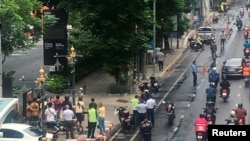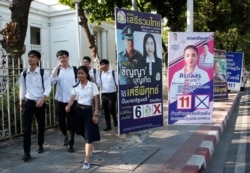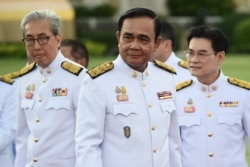Thai authorities are casting suspicion on southern separatists while suggested broader political motives for a series of bombings that shook Bangkok Friday during a summit of top diplomats from the U.S., China and the region.
A low-level insurgency has been simmering for years in Thailand's far south — where Muslim militants want to break away from the Buddhist-majority country — but rarely spread as far north as the capital. Analysts say any insurgents involved in Friday's attacks may have been acting as mercenaries for other groups, as they have before.
The blasts hit five locations across Bangkok during the Friday morning rush hour, including a government office complex, army headquarters, the office of the defense secretary and a public transit train station, leaving four people with minor injuries.
Police arrested two men from Thailand's far south suspected of planting a pair fake bombs without explosives outside police headquarters on Thursday, near the venue where U.S. Secretary of State Mike Pompeo and Chinese counterpart Wang Yi were meeting with fellow foreign ministers from across Southeast Asia.
No one has claimed responsibility for the attacks, and authorities have yet to assign blame, though officials have said they were likely meant mainly to dent the government's image with visiting foreign dignitaries.
Police chief Chakthip Chaijinda said a preliminary investigation suggested the bombings were the work of the "same group" behind a series of explosions across the south in August 2016, according to the Bangkok Post. Citing anonymous sources, the newspaper said they may have been backed by "political or other groups."
Panitan Wattanayagorn, a recent security adviser to Deputy Prime Minister and former defense chief Prawit Wongsuwan, told VOA that Thailand's southern insurgents have largely refrained from venturing north since a spate of attacks on Bangkok buses in the 1970s drew strong public rebuke.
As a general rule, "they don't operate in Bangkok because they need support from the rest of the country for their cause," said Panitan, who now lectures on politics at Thailand's Chulalongkorn University.
But they do still strike outside the Muslim-majority provinces bordering Malaysia on occasion, said Don Pathan, a program officer for The Asia Foundation, who has been studying the south for the past two decades.
"They have hit areas outside their region, but that's once in a blue moon, and usually it's to make a point about something, you know. It's not their theater," he told VOA.
Pathan said one of the insurgent groups most recently set off a small bomb in Bangkok in 2013. Four men from the south were convicted of the crime, he said, though officials never publicly linked them to any of the separatist movements.
The capital's deadliest bombing came in 2015 when an attack on a Buddhist shrine in downtown Bangkok killed 20 people. Two Chinese Uighur's were arrested.
In 2017, the bombing of a Bangkok hospital injured 21 people. Authorities arrested an opponent of the military junta that seized power from an elected government three years earlier.
Friday's bombings came only weeks after that junta relinquished power to a civilian government. Ex-general and coup leader Prayuth Chan-ocha returned as prime minister and fellow junta leaders took other top posts after elections in March that the military allegedly rigged in its favor.
Pathan said peace talks to settle the southern insurgency have meanwhile stalled between government negotiators who want to handle the conflict internally and separatists who want to involve international mediators.
If any members of those groups were involved, he said, it was possible they were only paid to work for others.
"In the past, some of these guys ... insurgent guys, have sold their services or their expertise to criminal elements in Thailand, criminal-slash-political elements," he said.
Panitan agreed.
"That link has to be [made] clear, that it's not a separatist group targeting Bangkok, but their individual members may venture out to organized crime, drug trafficking or act as an agent of local interest groups who are in conflict, including politicians," he said.
But Panitan also noted that the insurgent attacks in the south, while down in number compared to a few years ago, were increasingly targeting urban areas across the region. Pathan also noted a modest spike in their attacks on security forces in recent weeks.
Neither expected the government to react to Friday's bombs in Bangkok, however, by reverting to the heavy-handed security measures of the junta years. Prayuth has vowed as much in public.
"It could be politically damaging if they do that," he said. "As a quote-unquote civilian government, they want to move away from that iron fist, strong-man governance."
It may still work for them in the south, he added, "but Bangkok is a different kind of battleground — a political battleground."











